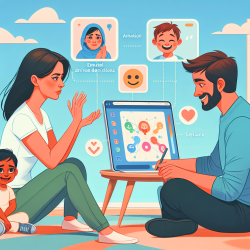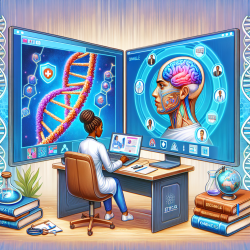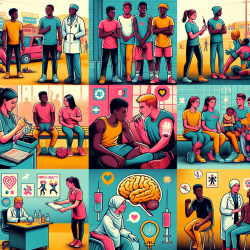Introduction
In the ever-evolving field of speech-language pathology, integrating cutting-edge technology and research into practice is crucial for enhancing therapeutic outcomes. The research article "Emotion-Aware Scene Adaptation: A Bandwidth-Efficient Approach for Generating Animated Shorts" provides valuable insights that can be applied to online therapy services, such as those offered by TinyEYE, to improve engagement and effectiveness in therapy sessions.
Understanding Emotion-Aware Scene Adaptation
The study presents a novel approach that utilizes large-scale generative models to create animated short films that are semantically and emotionally aligned with real-life scenes. This method involves converting visual content into text using semantic understanding technology, enhancing it with emotional cues through reinforcement learning, and finally generating visual media that maintains the original semantics and emotions.
Application in Online Therapy
For practitioners in online therapy, integrating these findings can significantly enhance the therapeutic process. Here are some practical applications:
- Enhanced Engagement: Animated shorts can capture the attention of children more effectively than static images or text, making therapy sessions more engaging.
- Emotional Connection: By incorporating emotional cues, therapists can create a more empathetic and relatable environment, which is crucial for effective therapy.
- Bandwidth Efficiency: The approach's emphasis on bandwidth efficiency ensures that high-quality content can be delivered even with limited internet resources, a common challenge in online therapy.
Encouraging Further Research
While the current research provides a solid foundation, further exploration is encouraged to tailor these techniques specifically for speech-language therapy. Areas for future research include:
- Customization: Developing customizable animated content that can be adapted to individual therapy goals and client preferences.
- Outcome Measurement: Establishing metrics to evaluate the effectiveness of animated content in achieving therapeutic goals.
- Integration with Existing Platforms: Researching ways to seamlessly integrate this technology with existing online therapy platforms.
Conclusion
Integrating emotion-aware scene adaptation into online therapy can revolutionize the way therapy is delivered, making it more engaging and effective. By leveraging research and technology, practitioners can create a more dynamic and impactful therapeutic experience for children. To delve deeper into the research, please read the original paper Emotion-Aware Scene Adaptation: A Bandwidth-Efficient Approach for Generating Animated Shorts.










